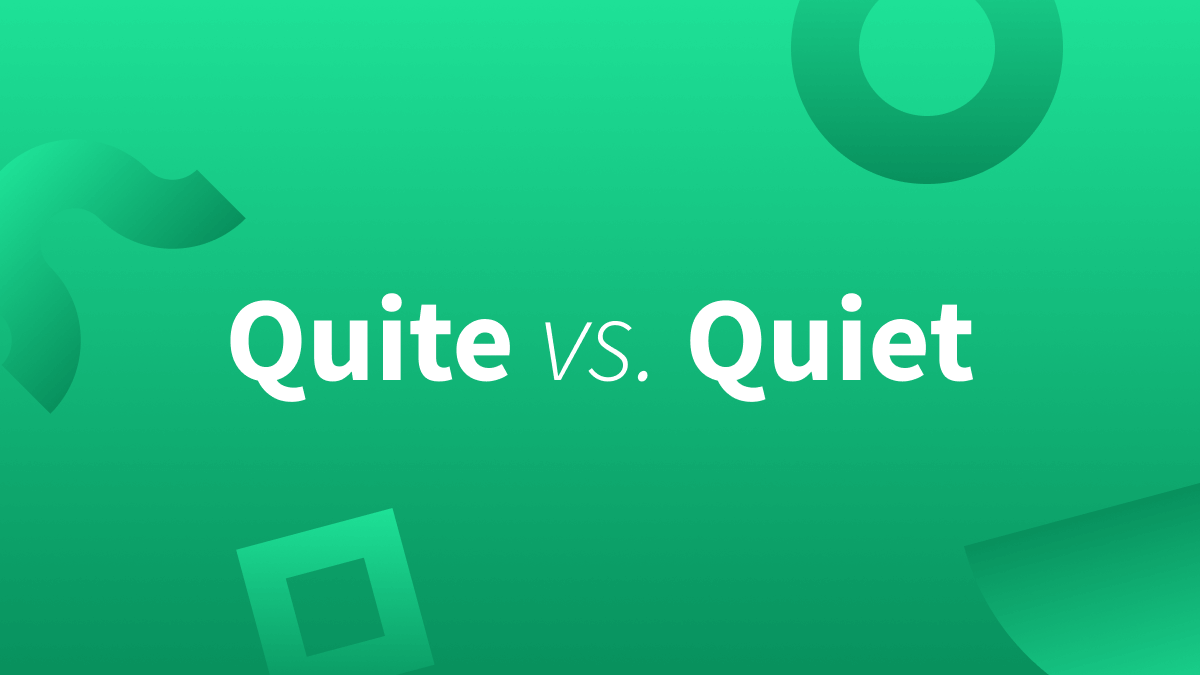Quick Summary on “Quiet” and “Quite”
- The main difference between quiet and quite is that quiet can function as an adjective, noun, or verb, while quite can only function as an adverb.
- As an adjective, quiet means “free from noise or uproar.”
- When used as a noun, quiet refers to “the quality or state of being quiet.”
- As a verb, quiet means “to cause to be calm or less noisy.”
- Quite is an adverb that means “very,” “completely” or “to some degree.”
- ○ Mr. Thomson walked into a quiet and suspicious classroom.
- ○ Johan went to the spa for some peace and quiet.
- ○ I wanted to quiet my racing mind.
- ○ I was quite surprised that I turned in the assignment on time.
Quite vs. Quiet
Often, the incorrect use of quiet and quite is a result of a typo. Other times, writers are unsure of the meaning of the two words. Either way, we’re going to explain what these two commonly confused words mean and show you how to remember when to use quiet instead of quite.
How Do You Spell “Quiet”?
“Quiet” as an Adjective
When you’re referring to the absence of noise, especially loud noise, then the word you want is quiet.
When used as an adjective (a word that describes or modifies a noun), quiet is defined as “free from noise or uproar.”
The girl was looking for a quiet place to take a nap.
However, as an adjective, quiet carries a few more similar yet different meanings. For instance, when a person is described as quiet, it means they speak very little or that they have an easy-going temperament.
Sloane is known to be a quiet and reserved student.
Quiet is also occasionally used to describe something as “unobtrusive” or “calm.”
I was looking for a light and quiet color to paint my room.
“Quiet” as a Noun
As a noun, quiet refers to “the state of being calm and without much noise.”
Mark enjoys the quiet of his office.
“Quiet” as a Verb
Quiet can also be used as a verb that means “to become or cause someone/something to be calm or less noisy.”
I attempted to quiet the puppies before their owners arrived, but they were too rambunctious.
How Do You Spell “Quite”?
While quiet can function as several parts of speech, quite can only function as an adverb.
Quite can mean “completely,” “to a considerable degree,” or “very.”
Billy said he wasn’t quite finished with the task.
=
Billy said he wasn’t completely finished with the task.
Sarah is quite excited, isn’t she?
=
Sarah is very excited, isn’t she?
Quite a few or quite a bit are expressions that mean “many” or “a considerable amount.”
There are quite a few problems we have to deal with.
The Difference is Quite Clear
There are three things to keep in mind that’ll help you remember the difference between quiet and quite.
- Quiet most commonly refers to an absence of sound, also known as silence. Both quiet and silence have two syllables.
- Quite can only ever function as an adverb.
- LanguageTool can detect the incorrect used of quiet and quite. dditionally, this multilingual spelling and grammar checker can recognize various types of errors and provide formatting improvements.

